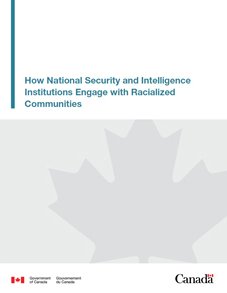By The National Security Transparency Advisory Group (NS-TAG)
The National Security Transparency Advisory Group (NS-TAG) was created in 2019 as an independent and external body. Our role is to advise the Deputy Minister of Public Safety Canada, and the rest of the national security and intelligence community, on steps to infuse transparency into Canada’s national security policies, programs, and activities in a manner that will increase democratic accountability and public awareness. Throughout our consultations in the past three years, we frequently heard about the trust gap between the country’s national security institutions and Canadians, and in particular with racialized Canadians. This matters: it is essential, in a healthy liberal democracy, for everyone to trust government and its agencies designed to keep us safe. In this context, we decided to focus our third report on the issue of relations between national security and intelligence institutions and racialized communities. We believe that a broad approach to transparency is essential in general – and in particular in national security and intelligence institutions’ relations with racialized communities. At times, these relations have been marred by mistrust and suspicion, and by errors of judgement by these institutions, which impacted communities have perceived as discriminatory. We make a number of recommendations in this report on how national security and intelligence institutions can be more transparent in their engagement with racialized communities. Engagement can help government understand specific needs, identify local voices, open and build dialogue with them, and build trust and a shared understanding of common challenges. Engagement also provides a bridging function: engagement programs work on behalf of multiple parts of the government, exchanging information with external stakeholders and bringing it back inside the government to – ideally – feed into policy and operational processes. Engagement with racialized communities needs to involve a two-way conversation. As we heard in our consultations, too often engagement involves, in practice, government officials offloading a prepared message and failing to listen to the concerns of stakeholders. Constructive engagement should instead be based on dialogue; government officials should be attuned to the questions and concerns of stakeholders, listen to them, and be prepared and willing to respond. More and better engagement with racialized communities is essential. But for such engagement to be feasible, our outreach sessions made clear that deeper structural challenges in national security and intelligence institutions must be addressed. As such, our report also offers recommendations on these broader issues, notably on how to enhance diversity and inclusion and how to make complaints mechanisms more accessible to racialized and other vulnerable groups. As digitization accelerates, the data-driven dimensions of national security continue to expand at exponential rates. As a result, the national security apparatus is becoming more dependent on algorithmic methodologies and digital tools to gather and process massive data holdings, a reality that the Covid-19 pandemic has accelerated. It is clear, however, that systemic biases in Artificial Intelligence (AI) design can have perverse impacts on vulnerable individuals or groups of individuals, notably racialized communities. These biases reflect not only specific flaws in AI programs and organizations using them, but also underlying societal cleavages and inequalities which are then reinforced and potentially deepened. AI that poses a threat to racialized communities further erodes trust in national security and intelligence agencies and prohibits effective relationship building. There is growing agreement that many aspects of openness, oversight, and engagement play a vital role in ensuring accountability and effectiveness in current and future AI deployments.
Ottawa: Public Safety Canada, 2022. 84pg




